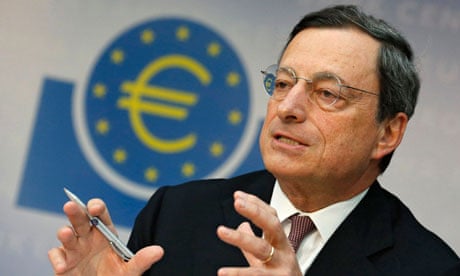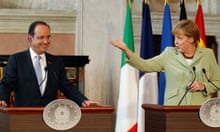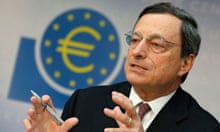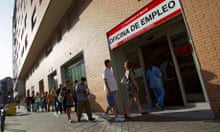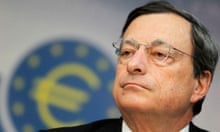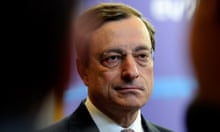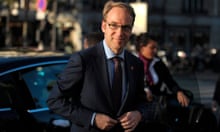Mario Draghi, president of the European Central Bank, said on Thursday the euro was "irreversible" and promised to do everything within his power to save it.
Speaking at the UK government's Global Investment Conference in London, Draghi said: "Within our mandate, the ECB is ready to do whatever it takes to preserve the euro. And believe me, it will be enough."
The news sent the euro up 1% against the dollar, to $1.2315, and it also gained against other major currencies. Spanish and Italian borrowing costs eased, after Draghi appeared to signal that the ECB was prepared to act to calm the bond markets.
"If government borrowing premia hurt monetary policy transmission, they are in our mandate," he said.
The yield on Spanish 10-year debt dipped to a whisker above 7%, at 7.009%, while Italian 10-year yields fell to 6.1%.
Draghi said the eurozone was much stronger than people acknowledged and progress over the last six months had been remarkable. "The last summit was a real success as it was the first time that all the leaders of 27 countries, including the UK, said the only way out of this crisis is to have more Europe. This means that much more of what is national sovereignty is going to be exercised at supranational level."
Draghi was sharing the stage with Sir Mervyn King, governor of the Bank of England, who took the opportunity to deflect blame for the financial crisis from the banking sector. "Of course there was bad behaviour," he said. "But this was a crisis which emanated from major mistakes in macroeconomic policy around the world, and fundamentally the inability to successfully co-ordinate macroeconomic policy so that globally you wouldn't get the imbalances, the capital flows, that created the difficulties in the banking system."
The day kicks off two weeks of investment summits aimed at attracting more foreign investment into the UK and promoting British business. Based in Lancaster House, the summit is taking place within earshot of the beach volleyball at Horse Guards Parade and aims to take advantage of the influx of foreign dignitaries for the Games.
The event offers some respite for trade minister Lord Green, who is under pressure because of his role as chief executive and then chairman at HSBC when the bank laundered money for Mexican drug barons and possibly even terrorists.
Green welcomed delegates to the conference and exchanged a warm handshake with King, among others. Green was promoting the UK as a great place to do business, alongside Lord Sassoon, commercial secretary to the Treasury, in a change to the schedule. He had been due to share the podium with Stuart Gulliver, current chief executive of HSBC, but Gulliver withdrew from the conference after the money laundering revelations.
